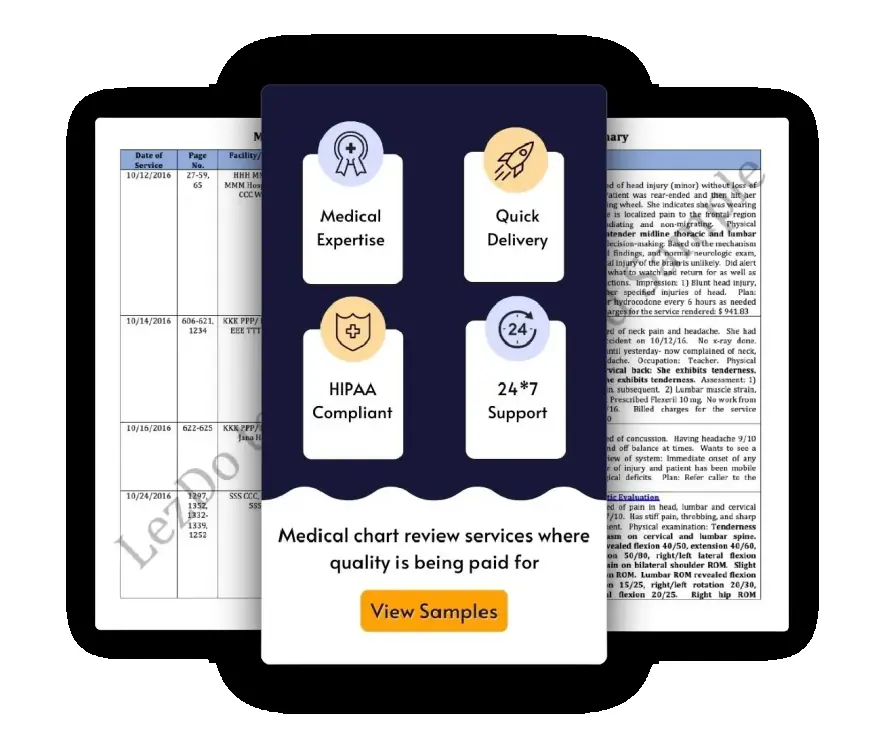The Legal Lens: How Medical Documentation Services Shape Case Outcomes in the U.S.
Discover how services like medical record review, medical chronology, and deposition summaries support legal and insurance processes across the U.S.

When legal matters intersect with healthcare, documentation becomes the backbone of the case. Whether it’s a personal injury claim, medical malpractice dispute, or disability litigation, the accuracy and clarity of medical records play a pivotal role in determining outcomes. In the United States, the demand for structured, expertly reviewed medical documentation continues to rise—driven by law firms, attorneys, and insurance carriers that must rely on precise, objective evidence.
To meet these demands, a spectrum of specialized services has emerged, supporting professionals through tools like medical record review, medical chart review, medical chronology, and deposition summary. This article examines the purpose and application of each, and how they collectively contribute to informed legal and insurance decisions.
Dissecting the Core: Medical Record Review
Every legal or insurance case involving medical care begins with a medical record review. This process involves examining treatment records, hospital notes, diagnostics, prescriptions, and progress reports. The goal is to understand what happened medically and how it relates to the legal claim.
Medical record review services are used to identify gaps, evaluate consistency in care, and detect patterns that support or dispute claims. For attorneys, these services offer valuable insight into causation and liability. For insurers, they are essential for claim validation and fraud detection.
Different types of medical record review companies specialize in tailored approaches. Medical record review for attorneys emphasizes legal relevance, while medical record review for law firms supports broader case-building strategies. In contrast, medical record review for insurance companies focuses on claim legitimacy and benefit authorization.
Narrowing the Focus: Medical Chart Review
While record reviews provide a general picture, medical chart review drills down into the clinical details. This includes physician notes, nursing logs, surgical records, lab reports, and diagnostic test results. The goal is to evaluate the actions of healthcare providers in specific contexts.
Medical chart review services are frequently used in medical malpractice or complex injury cases where standard of care is under scrutiny. By highlighting treatment sequences and pinpointing deviations, these reviews help legal professionals understand how and when clinical decisions were made.
Experienced medical chart review companies present their findings in structured, concise reports—ready for use in court, mediation, or insurance proceedings.
Structuring the Evidence: Sorting, Indexing, and Hyperlinking
Before any analysis can begin, vast amounts of medical data must be made manageable. That’s where medical sorting and indexing becomes essential. This process organizes documents chronologically, categorically, or by provider to support easier access and faster review.
Modern litigation also benefits from sorting indexing and hyperlinking services, which turn large digital medical files into interactive documents. Hyperlinks embedded in a digital index allow attorneys or analysts to instantly access specific pages or sections, streamlining workflow and reducing the chance of missed information.
Condensing Complexity: Medical Summaries
Reading and interpreting raw clinical data requires significant time and expertise. That’s why medical record summary services are in high demand. These summaries distill vast records into structured narratives or bullet-point overviews, emphasizing legally relevant medical events.
Medical summaries for law firms focus on injury timelines, diagnostic clarity, and the relationship between symptoms and treatment. On the other hand, medical narrative summaries are written in a story-like format, helpful for juries, judges, or other non-medical stakeholders.
Both types of summaries help reduce information overload and guide legal arguments toward the key facts.
Creating Timelines: Medical Chronology
Establishing a clear sequence of events is crucial in legal and insurance contexts. Medical chronology services provide a structured timeline of symptoms, visits, procedures, and follow-ups. This visual progression supports arguments about causation, delay, or progression of conditions.
Medical chronology summary services offer condensed timelines ideal for early case assessments, while comprehensive medical chronology services dive deep into the full spectrum of care. A professionally created medical record chronology often forms the backbone of expert testimony and cross-examination strategy.
Clarifying Testimonies: Deposition Summaries
When witnesses are deposed in legal cases, the resulting transcripts can be hundreds of pages long. Extracting key insights from these transcripts can be time-consuming, which is why deposition summary services are essential.
A deposition summary identifies crucial statements, contradictions, admissions, and relevant testimony. These summaries are used to prepare legal arguments, identify new leads, and reduce the complexity of witness statements.
Attorneys often rely on deposition summary services to streamline their trial preparation and maintain quick reference points throughout proceedings.
A System of Interconnected Services
Each of these services—medical record review, medical chart review services, medical chronology services, deposition summary services, medical narrative summaries, medical record summary services, medical sorting and indexing, and sorting indexing and hyperlinking services—serves a specific function. Yet when used together, they form a complete support system that empowers legal and insurance professionals to build cases grounded in clarity and accuracy.
Attorneys can approach court with confidence, knowing that all evidence is structured, referenced, and vetted. Insurance professionals can evaluate claims with efficiency, supported by clear documentation and defensible decisions.
Real-World Application in the U.S. Legal Landscape
In the U.S., these services play a role in many types of litigation and claims:
-
In wrongful death and malpractice cases, medical chart review reveals the specifics of clinical decisions.
-
In injury claims, medical record summary services present the medical history in a concise, case-friendly manner.
-
In fraud detection, medical record review for insurance companies uncovers discrepancies and patterns.
-
For trial preparation, deposition summary services streamline attorney strategy.
-
To prove continuity or disruption in care, medical chronology and medical record chronology offer the necessary timeline.
The U.S. legal system increasingly depends on accurate medical insights. These services bring structure to complexity and support fact-based case outcomes.
Conclusion: A Structured Approach to Medical Evidence
In any legal or insurance process involving health records, clarity and structure are non-negotiable. The growing complexity of healthcare documentation demands more than just review—it requires professional analysis, organization, and presentation. That’s why these services have become essential tools for law firms and insurance teams across the United States.
Organizations like lezdotechmed provide these services to support informed decision-making in medical-legal contexts. By integrating expertise from both medical and legal domains, they help transform disorganized records into structured, legally actionable data.
As litigation and claims become more evidence-driven, the ability to decode and document the medical side of a case is no longer a luxury—it’s a necessity.
What's Your Reaction?
 Like
0
Like
0
 Dislike
0
Dislike
0
 Love
0
Love
0
 Funny
0
Funny
0
 Angry
0
Angry
0
 Sad
0
Sad
0
 Wow
0
Wow
0
















































